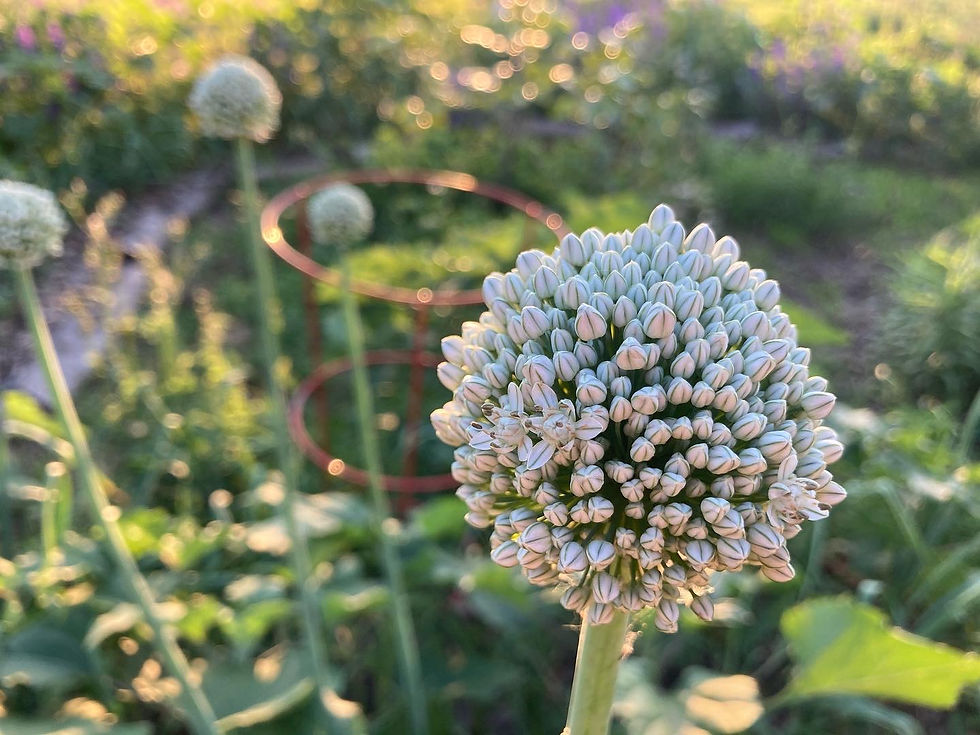Embracing Diversity in Your Central Texas Herb Garden: A Holistic Approach to Planting
- smalltownfarm
- Feb 2, 2024
- 3 min read
In our gardening philosophy, we tend to avoid strict divisions for food, medicine, flowers, and habitat. We blur the boundaries as often as possible and invite all these elements to converge. Plants thrive in community just like people do. And our garden is its own whole community that is diverse, magical, and ever changing.
As you plan your Central Texas garden ecosystem, here are some herbs we invite you to consider. All these herbs attract pollinators, are either perennial or self-seeding and they’re ones that we absolutely love. Some do well tucked straight into your food garden while others are more ambitious and best worked with as a drought-tolerant ground-cover nearby.
This is certainly not an exhaustive list of herbs you can tuck into your Central Texas garden. We'll keep adding to this as we can, but it's a good start. Maybe there are some herbs in here that you'd like to get to know. All these photos are from our own yard and garden.
Many people grow cilantro for the leaves. And since they keep giving it a haircut, they never get to see the beautiful blooms this plant makes. We grow cilantro primarily for the seeds - coriander seeds! And since we're waiting for the seeds to form, we get to see the sweet little flowers this plant makes.

These plant friends attract swallowtail larvae so plant extra and everyone can share. You'll be happy you did when you see the butterflies fluttering around your garden!

calendula is an easy to grow annual, does well in containers or in the ground, has the cutest seeds ever, blooms steadily throughout the spring and fall, and is a wonderful ally for your skin.

All basils, including thai basil and tulsi/holy basil, which we especially love for tea. This is a photo of a perennial basil we grow called a African blue basil. It doesn't go to seed and the bees go nuts over the long-lasting blooms!

I could spend an entire hour talking about this plant. Literally. I've done it. If I had to choose just a few plants to know and grow, yarrow would be one of them.

Our favorite Texas wildflower, beloved by the bees, and an ally that we find helpful in infused honeys, oxymels, and sinus steams. We steward a big patch that grows in abundance in our backyard. Bee balm is so easy to cultivate in our own yards and gardens that there's no need to forage. Let's leave the wild plants to be wild.

This is a wonderfully ambitious, and we think underappreciated, Central Texas plant. Once heartleaf skullcap gets going, it takes over big patches, blanketing the ground during the winter months with it's fuzzy blueish-grey leaves. Then it shoots up gorgeous flower spikes in the spring, goes underground in the summer, and returns in the fall with friends. We often see hummingbirds enjoying these blooms as much as the bees and butterflies.

Goldenrod is lovely fall bloomer that the bees adore. It's another ambitious Central Texas plant that will thrive without much care and quickly spread to fill in an area. Another nice candidate to act as a groundcover in an area that would otherwise be bare.

Mullein is a gorgeous biennial plant with big fuzzy leaves and a tall yellow flower spike. Plant it in the middle of your compost-heavy food garden and it'll quickly die. But plant it on the outskirts in an area that is rocky or sandy (like where our caliche driveway meets our garden bed) and it'll thrive.



🌱Leeks and alliums

We often have these plants available at our market booths, and we always love matchmaking people with plants suited to their space. Here's how to get plants from us.

